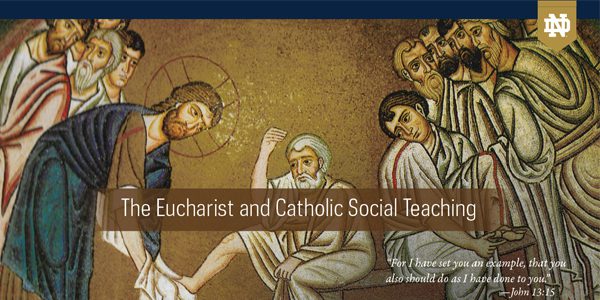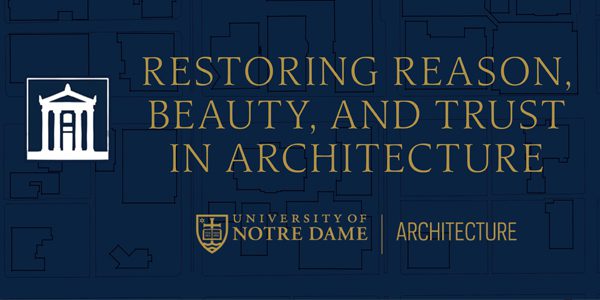Literature & Film in Lockdown – Introduction: Literature and Plague
Subscribe to the ThinkND podcast on Apple, Spotify, or Google.
Featured Speakers:
- Susan Ohmer, The William T. and Helen Kuhn Carey Associate Professor of Modern Communication, University of Notre Dame
- Kieron Webb, Head of Conservation, British Film Institute
- Rev. Jim Lies C.S.C., Director for Academic Initiatives & Partnerships, University of Notre Dame, London, England
The first session of the mini-course on Literature and Film in Lockdown and the debut of the Kylemore Book Club featured Barry McCrea, a Professor of English and the Donald R. Keough Family Professor of Irish Studies at the University of Notre Dame, with Lisa Caulfield, the Director of the Notre Dame Global Center at Kylemore Abbey, as the moderator. The inspiration for this series emerged from the experience of the coronavirus pandemic and the appreciation of a cohort of McCrea’s students after exploring this topic with him in a previous course. The first session introduced the participants to the topic and addressed questions on literature as a resource for the individual’s experience of a pandemic.
To begin the session, McCrea offered a short synopsis of the pre-recorded videos assigned as homework. Though literature is not often thought of as a resource that can offer immediate assistance in a trying circumstance, McCrea expressed his belief that in the case of pandemics, it can. Because plagues, famines and pandemics are a frequently recurring experience throughout human history, there is copious literature that discusses the experience of living through the isolation and grief associated with them, some of which will be discussed throughout the series. McCrea noted that the coronavirus pandemic is different from anything humans today have had to manage psychologically, and it has affected many very deeply. Also, though this experience is happening to all of humanity at the same time, individuals lack a way of talking about the psychological toil of it with those close to them, making it a very lonely experience for many. To illustrate his point, McCrea identified three psychological effects of the experience of living through a pandemic. The first is a distorted sense of time and the inability to project oneself into the future. During isolation, time passes in a very different way and the future becomes something that can no longer be predicted. The second is a lost sense of self. Daily lives are often defined by routines, leisure activities and family schedules. When these things are eliminated, many begin to question the meaning of their lives. The last effect is a distorted relationship with others. Humans are a species that requires interaction with others. However, during a pandemic, individuals begin to see others as a threat to their well-being instead of an integral part of it. McCrea concluded his presentation with an overview of the texts and films to be discussed in the coming sessions.
After a breakout session for participants, Caulfield began the question and answer portion of the session. McCrea responded to a question about the ten plagues in the Bible by highlighting the common connection seen between plagues and political tumult through history and literature. The questions then quickly shifted to the American society during this time. McCrea drew the participants’ attention to the fact that a pandemic greatly affects the dynamics of a society. The interconnectedness of supply chains and the spread of disease displays the underlying layout of the individuals within a society. McCrea expressed his opinion that the poor are never the winners in a time of crisis. The polarity between groups of people becomes apparent in their differing experiences, especially between those that have the resources to live comfortably despite lockdowns and economic downturns and those that don’t.
McCrea then responded to a series of questions about how our communities will emerge post-pandemic. He emphasized the fact that the political and societal dynamics that are beginning to emerge, such as racial inequalities in the United States, will be accelerated by the pandemic and the aftermath of it. A new world will not come out of nowhere. Instead, society will move in the same direction it was before the pandemic, only faster. Though much of humanity is experiencing both the grief of physical loss and the loss of the lives they knew before, McCrea recommended going through this experience collectively as much as possible. McCrea concluded the session by emphasizing the hope that can be found in literature and the fact that humanity has emerged from this experience before and become stronger through it.
- Although literature is not usually a resource for self-help, in the case of pandemics it can be. It offers a framework for us to attach our experiences to in order to be able to process them. (4:14)
- The psychological effects of a pandemic include an inability to project oneself into the future, a lost sense of self and a distortion of relationships with others. (6:33)
- Pandemics are a frequently recurring experience throughout human history. They are one of the most commonly experienced phenomena. (8:31)
- Pandemics make visible the extent of human interconnectedness, both in terms of the spread of the disease and the chain of people it takes to run our society. (28:11)
- History can’t teach us all we need to know about pandemics of the past because individual experiences must be generalized. Literature can tell us what it feels like to experience isolation because it relays one individual’s experiences. (34:00)
- A pandemic accelerates the direction the society was moving in pre-pandemic. New things don’t happen. Instead, the underlying tendencies present before are accelerated and made visible. (38:23)
- “We are lacking a framework to attach our experiences to, an outlet to map our experiences.” (Barry McCrea, 4:14)
- “The ability to project yourself into the future is a fundamental part of identity that is being taken away from us right now.” (Barry McCrea, 7:01)
- “We are a gregarious species with a physiological and biological need to be around other people. Right now, we perceive other people and other people’s bodies as threats to our wellbeing.” (Barry McCrea, 7:39)
- “A plague arises in nature. It’s not something that we make ourselves. And nature is fundamentally indifferent to us, our politics, our social systems, our desires, our beliefs. Nature doesn’t care.” (Barry McCrea, 31:22)
- “Because you have to abstract individual experiences into a collective story to turn it into history, you lose the intimate feeling of living through something that each individual has to go through. I think fiction is helpful because it can tell us what it feels like to be in a pandemic, to be one person in a pandemic.” (Barry McCrea, 34:00)
- “Moments of mass disruption, like a plague, accelerate or exaggerate things that were already, perhaps invisibly, happening before.” (Barry McCrea, 40:02)
- “The overriding emotion was one of relief, to see this experience recorded elsewhere.” (Barry McCrea, 52:01)
Related Content
Eucharistic Abundance and Social Regeneration
In 2022, the United States Conference of Catholic Bishops (USCCB) announced that the Church in this country would undertake a Eucharistic Revival, as a way to bolster Catholics’...
View EventHow Cities Speak To Us
Professor Emily Talen joins the School of Architecture to share her work at The Urbanism Lab and its focal point at the University of Chicago for the study of the built...
View EventThe Black National Anthem & Parent’s Signing Off On Children Reading Black Books
In this week’s episode, Isaiah and Tykiera talk about some tweets about Black people that took Twitter by storm. They also talk about The Black National Anthem, Lift Every Voice...
watch video


